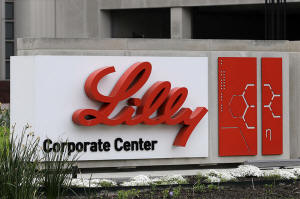FDA says knockoff versions of Lilly obesity drug must come off the
market
 Send a link to a friend
Send a link to a friend
 [December 20, 2024]
By MATTHEW PERRONE [December 20, 2024]
By MATTHEW PERRONE
WASHINGTON (AP) — Specialty pharmacies and online companies that have
been selling off-brand copies of two blockbuster drugs for obesity and
diabetes will need to phase out their versions next year under a federal
decision issued Thursday.
The Food and Drug Administration said that a nationwide shortage of Eli
Lilly’s Zepbound and Mounjaro has been resolved, eliminating the need
for copycat versions of the drugs that have become wildly popular with
Americans trying to lose weight.
The decision is a win for Lilly — which had been pressing the FDA to
take the step for months — and is expected to impact how patients access
the drugs, including how much they pay.
Zepbound is FDA-approved to treat obesity and Mounjaro is approved for
diabetes. They use the same active ingredient, tirzepatide.
The FDA said Thursday that “Lilly’s supply is currently meeting or
exceeding demand,” after two years of shortages.

Both drugs are part of the GLP-1 class that has shown unprecedented
results for helping people shed weight by decreasing appetite and
boosting feelings of fullness. Wegovy and Ozempic — competing drugs from
Novo Nordisk — remain on the FDA’s shortage list.
With demand for GLP-1 drugs booming, compounding pharmacies and
telehealth companies like Hims and Ro have jumped into the market,
selling cheaper versions online. People can usually get a month's supply
for several hundred dollars.
[to top of second column]
|

A sign for Eli Lilly & Co. stands outside their corporate
headquarters in Indianapolis on April 26, 2017. (AP Photo/Darron
Cummings, File)
 Thursday’s decision gives businesses
between 60 and 90 days, depending on their size, to phase out their
products.
The FDA permits compounded versions of brand name drugs when they
are in shortage, and the shift back to Lilly’s medications could
improve safety for consumers. The FDA warned patients last year
about problems with the ingredients and formulations of some GLP-1
drugs sold online. The agency has limited oversight of compounding
pharmacies, which are primarily overseen by state authorities.
Compounding pharmacies use raw drug ingredients to produce
customized versions of prescription medications — for instance, when
patients have allergies to certain ingredients. The industry has
grown into a multibillion-dollar business over the past decade amid
increasing drug shortages.
Demand for off-brand GLP-1 drugs has been amplified by aggressive
online promotions from telehealth companies, which aren’t subject to
the same marketing rules as drugmakers.
The FDA previously declared an end to the shortage of Mounjaro and
Zepbound in early October, but reversed its decision after public
pushback and a lawsuit filed by compounding pharmacies.
All contents © copyright 2024 Associated Press. All rights reserved |